新概念第一册学习笔记
裕兴新概念学习笔记第一册(81-84)
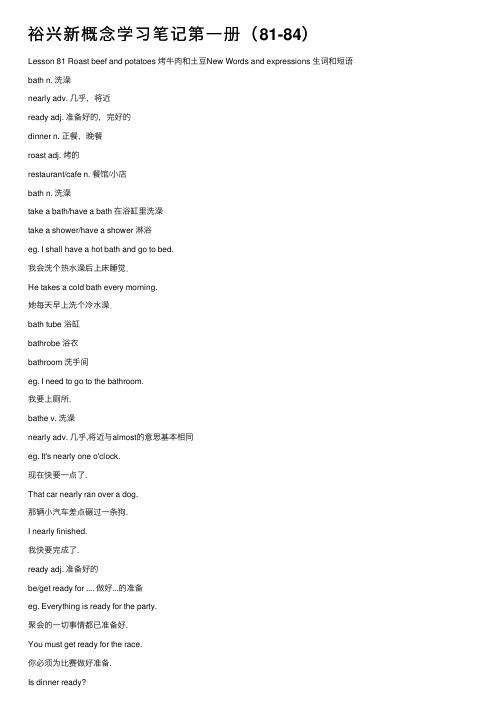
裕兴新概念学习笔记第⼀册(81-84)Lesson 81 Roast beef and potatoes 烤⽜⾁和⼟⾖New Words and expressions ⽣词和短语bath n. 洗澡nearly adv. ⼏乎,将近ready adj. 准备好的,完好的dinner n. 正餐,晚餐roast adj. 烤的restaurant/cafe n. 餐馆/⼩店bath n. 洗澡take a bath/have a bath 在浴缸⾥洗澡take a shower/have a shower 淋浴eg. I shall have a hot bath and go to bed.我会洗个热⽔澡后上床睡觉.He takes a cold bath every morning.她每天早上洗个冷⽔澡.bath tube 浴缸bathrobe 浴⾐bathroom 洗⼿间eg. I need to go to the bathroom.我要上厕所.bathe v. 洗澡nearly adv. ⼏乎,将近与almost的意思基本相同eg. It's nearly one o'clock.现在快要⼀点了.That car nearly ran over a dog.那辆⼩汽车差点碾过⼀条狗.I nearly finished.我快要完成了.ready adj. 准备好的be/get ready for .... 做好...的准备eg. Everything is ready for the party.聚会的⼀切事情都已准备好.You must get ready for the race.你必须为⽐赛做好准备.Is dinner ready?晚餐准备好了吗?be ready to do1) 已准备好做 ...eg. I am ready to go.我已准备好出发.2) 愿意做...eg. She is always ready to help others.她总是乐意助⼈.3) 眼看就要...eg. The rope is ready to break.绳⼦眼看就要断了.The child is ready to burst into tears.那⼩孩眼看就要⼤哭起来.dinner1) n. 餐,正餐(三餐中的主要⼀餐)eg. It's time for dinner.该进晚餐了.Dinner is ready.晚餐准备好了.2) n. (正式的) 宴会,晚会dinner party 宴会give a dinner 设宴be at dinner ⽤餐中have breakfast 吃早餐have lunch 吃午餐have supper 吃晚餐have dinner 吃晚饭restaurant n. 饭馆、餐馆cafe n. ⼩餐馆(在英国通常不供应酒类) cafeteria n. ⾃动⾷堂; ⾃助餐厅inn n. ⼩酒馆,⼩旅馆roast1) adj. 烤过的a roast chicken 烤鸡Beijine Roast Duch 北京烤鸭2) v. 烤、烧eg. I roasted a chicken.我烤了⼀只鸡.The beef is roasting nicely in the oven.⽜⾁在烤箱⾥烤得正好呢.3) n. 烤⾁eg. I want some roast.我想要⼀些烤⾁.grill v. (⽤烤架) 烧烤n. 烤架;烧烤的⾁类⾷物grill room 烤⾁馆bake v. 烤( ⾯包, 饼, 通常指在炉中烤)eg. Mother bakes bread or cookies on every Sunday.母亲每逢星期⽇就会烤⾯包或饼⼲.The bread is baking.⾯包正在烤着.baker ⾯包师/商at the baker's 在⾯包店⾥fry v. 油煎deep fry 油炸eg. Can you fry fish?你会煎鱼吗?fried adj. 油煎的deep fried adj. 油炸的fried fish n. 油炸鱼fried potatoes n. 油炸⼟⾖fried eggs n. 煎鸡蛋stew v. 焖,炖/ n. 炖⾁,焖菜eg. I have stewed the beef for two hours.⽜⾁已炖了两⼩时.stewed adj. 焖煮的stew pan n. 炖锅boil v. 烧开,煮熟boil an egg 煮鸡蛋instant boil 涮instant boil mutton 涮⽺⾁TEXT 课⽂Question: Why is Carol disappointed? 卡罗尔为什么感到失望? Listen to the tape then answer this question.听录⾳,然后回答问题。
新概念英语第一册自学笔记含课后练习答案:Lesson 117-118

新概念英语第一册自学笔记含课后练习答案:Lesson117-118新概念英语第一册117-118课课文重难点详解 further notes onthe text1.look for,寻找(强调动作过程);find,找到(强调寻找的结果)。
2.tommy had already swallowed them! 汤米已经把硬币咽了下去!句中用了过去完成时形式 had swallowed。
过去完成时用来表示过去两个动作中发生在前的那个动作。
显然,句中咽下硬币的动作发生在夫妇俩能够把硬币从汤米手中抢过来之前。
3.later that morning,那天上午的晚些时候。
later是副词late的比较级。
4.any changechange是个多义词,既有“零钱”的意思,也有“变化”的意思。
此处既可指“硬币”;也可指“情况的变化”。
这是双关(pun /p)n/)修辞法。
新概念英语第一册117-118课语法知识点 grammar in use过去实行时构成: be的过去式+现在分词。
过去实行时表示过去某时正在实行的情况或动作。
过去实行时和一般过去时经常在同一个句子里使用。
过去实行时表示过去正在实行的情况或动作,一般过去时则表示比较短暂的动作或事件。
过去实行时的时间状语从句一般由when,while及(just)as等来引导,说明主句中动作发生时的背景。
此外,可用 while或 at the time等强调同时实行的两种或几种动作。
请看例句:when i was doing the housework, my husband telephoned mefrom the office.当我正在干家务时,我丈夫从办公室打电话给我。
while i was listening to the stereo, my mother came into the room.我正在听立体声节目时,我母亲进房间了。
just as she was cleaning her shoes, george knocked at the door.她正在擦鞋时,乔治敲门了。
新概念英语第一册课文翻译及学习笔记
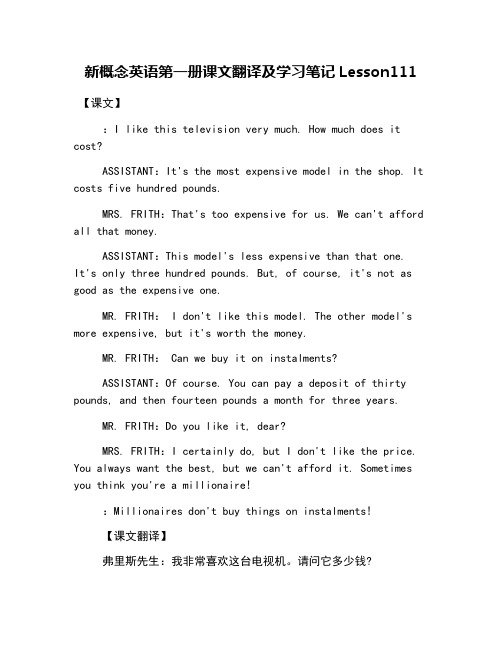
新概念英语第一册课文翻译及学习笔记Lesson111【课文】:I like this television very much. How much does it cost?ASSISTANT:It's the most expensive model in the shop. It costs five hundred pounds.MRS. FRITH:That's too expensive for us. We can't afford all that money.ASSISTANT:This model's less expensive than that one.It's only three hundred pounds. But, of course, it's not as good as the expensive one.MR. FRITH: I don't like this model. The other model's more expensive, but it's worth the money.MR. FRITH: Can we buy it on instalments?ASSISTANT:Of course. You can pay a deposit of thirty pounds, and then fourteen pounds a month for three years.MR. FRITH:Do you like it, dear?MRS. FRITH:I certainly do, but I don't like the price. You always want the best, but we can't afford it. Sometimes you think you're a millionaire!:Millionaires don't buy things on instalments!【课文翻译】弗里斯先生:我非常喜欢这台电视机。
新概念英语第一册1-72学习笔记要点

Lessons 1-2课文详注 Further notes on the text1.Excuse me 对不起。
这是常用于表示道歉的客套话,相当于汉语中的“劳驾”、“对不起”。
当我们要引起别人的注意、要打搅别人或打断别人的话时,通常都可使用这一表达方式。
在课文中,男士为了吸引女士的注意而使用了这句客套话。
它也可用在下列场合:向陌生人问路,借用他人的电话,从别人身边挤过,在宴席或会议中途要离开一会儿等等。
2.Yes?什么事?课文中的 Yes?应用升调朗读,意为:“什么事?”Yes?以升调表示某种不肯定或询问之意,也含有请对方说下去的意思。
3.Pardon?对不起,请再说一遍。
当我们没听清或没理解对方的话并希望对方能重复一遍时,就可以使用这一表达方式。
较为正式的说法是:I beg your pardon.I beg your pardon?Pardon me.它们在汉语中的意思相当于“对不起,请再说一遍”或者“对不起,请再说一遍好吗?”4.Thank you very much.非常感谢!这是一句表示感谢的用语,意为“非常感谢(你)”。
请看下列类似的表达式,并注意其语气上的差异:Thank you.谢谢(你)。
Thanks!谢谢!5.数字1~10的英文写法1—one 2—two 3—three 4—four 5—five6—six 7—seven 8—eight 9—nine 10—ten语法 Grammar in use一般疑问句一般疑问句根据其结构又分为若干种。
通过主谓倒装可将带有be的陈述句变为一般疑问句。
即将be的适当形式移到主语之前,如:陈述句:This is your watch.这是你的手表。
疑问句:Is this your watch?这是你的手表吗?(可参见 Lessons 15~16语法部分有关 be的一般现在时形式的说明。
)词汇学习 Word study1.coat n.上衣,外套:Is this your coat?这是你的外套吗?coat and skirt<英>(上衣、裙子匹配的)西式女套装2.dress n.(1)连衣裙;套裙:Is this your dress?这是你的连衣裙吗?(2)服装;衣服:casual dress 便服evening dress 晚礼服Lessons3-41.My coat and my umbrella please. 请把我的大衣和伞拿给我。
新概念英语第一册 学习笔记

新概念英语第一册学习笔记第61至72课61至72课涉及到的语法有:完全动词 have(2)(lesson 61)、情态动词must (lesson 61)、形容词比较级(lesson 63)、反身代词(lesson65)、时间与日期(lesson 66)、用介词at, on和in的时间短语(lesson 67)、一般过去时(2)(lesson 67、69、71)Lesson 61 A bad coldtongue n. 舌头remember v. 记得,记住。
含义较广,多指无意识地回忆起往事,也可指通过主观努力去记忆。
retell vt. 再讲,重复,重说recite v.背诵,朗读,叙述recall 记忆,记住,回忆,比remember文雅,指想方设法回忆已经遗忘之事。
recollect v.(不用于进行时)记起;回忆起;记得。
指在记忆中搜索,设法想起一时想不起的事情或人,强调过程。
remind 使想起,指经某人或某事的提醒而回忆起某件已遗忘之事。
memorize指有意识的下功夫把某事的整个细节都记在脑子里。
review v.复习,复查或重新考虑(某事物);思考(尤指往事),回顾repeat 引用,复述,仅强调口头或笔头重复别人的话或字句,并不必指明出处。
cite 指引经据典以示证明或凭据。
quote指不加剪裁的直接引用原文或原话。
[kwəut]fell ill, 感觉病了;look ill, 看起来有病。
前者指自我感觉,后者指外表形象。
ill是表语,look和feel都是系动词,可像am/is/are那样,后面跟形容词。
…so he must stay in bed for a week…因此他必须卧床休息一周。
so表示"因此"、"所以"。
for可以引出一段时间,表示某个动作持续多少时间。
又如:for two hours each day 每天两小时That's good news for Jimmy. 对吉米来说,这可是个好消息。
新概念第一册课文翻译及学习笔记【Lesson121、123、125】

【导语】新概念英语作为⼀套世界闻名的英语教程,以其全新的教学理念,有趣的课⽂内容和全⾯的技能训练,深受⼴⼤英语学习者的欢迎和喜爱。
为了⽅便同学们的学习,⽆忧考为⼤家整理了⾯的新概念第⼀册课⽂翻译及学习笔记,希望为⼤家的新概念英语学习提供帮助!Lesson121【课⽂】 Customer: I bought two expensive dictionaries here half an hour ago, but I forgot to take them with me. Manager: Who served you, sir? Customer: The lady who is standing behind the counter. Manager: Which books did you buy? Customer: The books which are on the counter. Manager: Did you serve this gentleman half an hour ago, Caroline? He says he's the man who bought these books. Caroline: I can't remember. The man whom I served was wearing a hat. Manager: Have you got a hat, sir? Customer: Yes, I have. Manager: Would you put it on, please? Customer: All right. Manager: Is this the man that you served, Caroline? Caroline: Yes. I recognize him now. 【课⽂翻译】 顾客:半⼩时以前我在这⾥买了两本很贵的辞典,但是我忘了拿⾛。
新概念英语第一册Lesson123~128课文翻译及学习笔记

【导语】学习新概念英语并不难啊。
你还在为英语成绩低拖后腿⽽烦恼吗?不要着急,⼩编为⼤家提供了“新概念英语第⼀册Lesson123~128课⽂翻译及学习笔记”。
相信加⼊学习当中的你,很快便不再受英语的困扰!还在等什么?和⼩编⼀起来学习吧!新概念英语第⼀册Lesson123~124课⽂翻译及学习笔记 【课⽂】 MIKE: Look, Scott. This is a photograph I took during my trip to Australia. SCOTT: Let me see it, Mike. SCOTT: This is a good photograph. Who are these people? MIKE: They're people I met during the trip. MIKE: That's the ship we travelled on. SCOTT: What a beautiful ship! SCOTT: Who's this? MIKE: That's the man I told you about.Remember? SCOTT: Ah yes. The one who offered you a job in Australia. MIKE: That's right. SCOTT: Who's this? MIKE: Guess! SCOTT: It's not you, is it? MIKE: That's right. MIKE: I grew a beard during the trip, but I shaved it off when I came home. SCOTT: Why did you shave it off? MIKE: My wife didn't like it! 【课⽂翻译】 迈克:看,这是我到澳⼤利来旅⾏时拍的⼀张照⽚。
新概念英语第一册自学笔记含课后练习答案:Lesson55-56
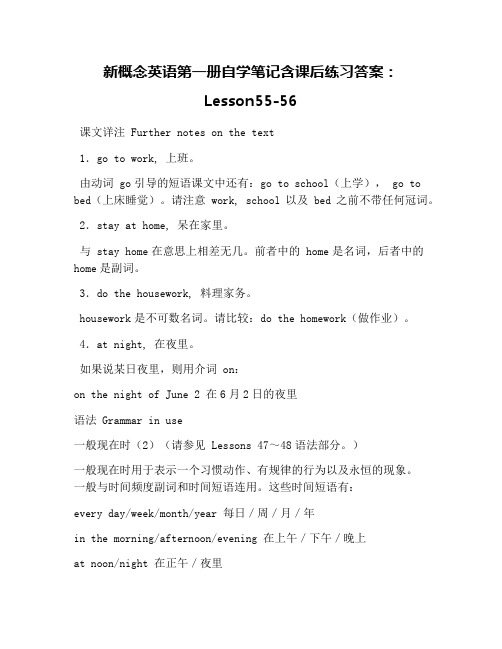
新概念英语第一册自学笔记含课后练习答案:Lesson55-56课文详注 Further notes on the text1.go to work, 上班。
由动词 go引导的短语课文中还有:go to school(上学), go to bed(上床睡觉)。
请注意 work, school以及 bed之前不带任何冠词。
2.stay at home, 呆在家里。
与 stay home在意思上相差无几。
前者中的 home是名词,后者中的home是副词。
3.do the housework, 料理家务。
housework是不可数名词。
请比较:do the homework(做作业)。
4.at night, 在夜里。
如果说某日夜里,则用介词 on:on the night of June 2 在6月2日的夜里语法 Grammar in use一般现在时(2)(请参见 Lessons 47~48语法部分。
)一般现在时用于表示一个习惯动作、有规律的行为以及永恒的现象。
一般与时间频度副词和时间短语连用。
这些时间短语有:every day/week/month/year 每日/周/月/年in the morning/afternoon/evening 在上午/下午/晚上at noon/night 在正午/夜里第3人称单数的谓语动词需加以变位,这可分为几种情况:(1)直接加 -s,如:come----comesarrive----arrives(2)以 -sh, -ch, -o 以及 -s结尾的动词加 -es,如:wash----washesgo----goeswatch----watchesdo----does(3)以辅音加 -y结尾的动词,把 -y改成 -i,再加 -es;而元音加-y结尾的动词,只加 -s即可:hurry----hurriescarry----carriesplay----playsstay----stays词汇学习 Word study1.arrive v.(1)到达;到来:We arrived home early. 我们很早就到家了。
新概念英语第一册课文翻译及学习笔记Lesson27~32

【导语】新概念英语⽂章短⼩精悍,语句幽默诙谐,语法全⾯系统。
适合各个阶层的⼈群学习参考。
相信有了新概念英语,你也可以成为“⼤神”级别的⼈物!还在等什么?快来加⼊学习吧!⼩编与您⼀起学习进步!新概念英语第⼀册课⽂翻译及学习笔记Lesson27~28 【课⽂】 Mrs. Smith's living room is large. There is a television in the room. The television is near the window. There are some magazines on the television. There is a table in the room. There are some newspapers on the table. There are some armchairs in the room. The armchairs are near the table. There is a stereo in the room. The stereo is near the door. There are some books on the stereo. There are some pictures in the room. The pictures are on the wall. 【课⽂翻译】 史密斯夫⼈的客厅很⼤。
客厅⾥有台电视机。
电视机靠近窗⼦。
电视机上放着⼏本杂志。
客厅⾥有张桌⼦。
桌上放着⼏份报纸。
客厅⾥有⼏把扶⼿椅。
这些扶⼿椅靠近桌⼦。
客厅⾥有台⽴体声⾳响。
⾳响靠近门。
⾳响上⾯有⼏本书。
客厅⾥有⼏幅画。
画挂在墙上。
【⽣词】 living room 客厅 near prep.靠近 window n. 窗户 armchair n. 扶⼿椅 door n. 门 picture n. 图画 wall n. 墙 【知识点讲解】 1. 今天我们要继续学习和⽅位有关的表达⽅式。
新概念英语1笔记
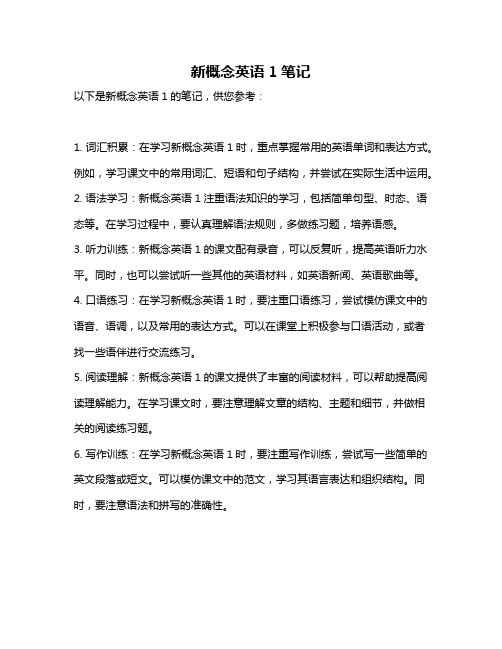
新概念英语1笔记
以下是新概念英语1的笔记,供您参考:
1. 词汇积累:在学习新概念英语1时,重点掌握常用的英语单词和表达方式。
例如,学习课文中的常用词汇、短语和句子结构,并尝试在实际生活中运用。
2. 语法学习:新概念英语1注重语法知识的学习,包括简单句型、时态、语态等。
在学习过程中,要认真理解语法规则,多做练习题,培养语感。
3. 听力训练:新概念英语1的课文配有录音,可以反复听,提高英语听力水平。
同时,也可以尝试听一些其他的英语材料,如英语新闻、英语歌曲等。
4. 口语练习:在学习新概念英语1时,要注重口语练习,尝试模仿课文中的语音、语调,以及常用的表达方式。
可以在课堂上积极参与口语活动,或者找一些语伴进行交流练习。
5. 阅读理解:新概念英语1的课文提供了丰富的阅读材料,可以帮助提高阅读理解能力。
在学习课文时,要注意理解文章的结构、主题和细节,并做相关的阅读练习题。
6. 写作训练:在学习新概念英语1时,要注重写作训练,尝试写一些简单的英文段落或短文。
可以模仿课文中的范文,学习其语言表达和组织结构。
同时,要注意语法和拼写的准确性。
新概念英语第一册完整学习笔记
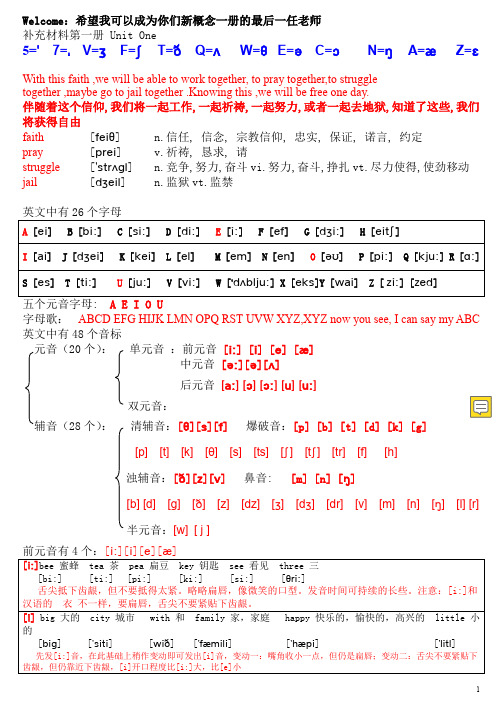
Welcome:希望我可以成为你们新概念一册的最后一任老师补充材料第一册 Unit One5= 7= V= F= T= Q= W= E= C= N= A= Z=With this faith ,we will be able to work together, to pray together,to struggletogether ,maybe go to jail together .Knowing this ,we will be free one day.伴随着这个信仰,我们将一起工作,一起祈祷,一起努力,或者一起去地狱,知道了这些,我们将获得自由faith[ ] n.信任, 信念, 宗教信仰, 忠实, 保证, 诺言, 约定pray [ ] v.祈祷, 恳求, 请struggle[ ] n.竞争,努力,奋斗vi.努力,奋斗,挣扎vt.尽力使得,使劲移动jail[ ] n.监狱vt.监禁字母歌:ABCD EFG HIJK LMN OPQ RST UVW XYZ,XYZ now you see, I can say my ABC 英文中有48个音标元音(20个):单元音:前元音[ ] [ ] [ ] [ ]中元音[ ][ ][ ]后元音[ ] [ ] [ ] [ ] [ ]双元音:辅音(28个):清辅音:[ ][ ][ ]爆破音:[p] [b] [t] [d] [k] [g][p] [t] [k] [θ] [s] [ts] [ ] [t ] [tr] [f] [h]浊辅音:[ ][ ][ ]鼻音: [m] [n] [ ][b] [d] [g] [ ] [z] [dz] [ ] [d ] [dr] [v] [m] [n] [ ] [l] [r]半元音:[w][ j ]清辅音[ ]浊辅音[ ]舌尖抵下齿龈,但不要贴紧,气流由舌尖和下齿之间流出清辅音 [ ]浊辅音 [ ]上齿轻放在下齿上,但不要咬唇,气流由上齿和下齿之间冲出清辅音 [ ]浊辅音 [ ]以th打头的单词一般是发[ ]、[ ]经典口语:1. a bad apple一个坏苹果->坏蛋,惹麻烦,不诚实的人2. big apple大苹果->纽约的别称3. a fat cat肥猫->大款,暴发户(贬义)4. a hot potato棘手的问题5. a bird in the hand is worth two in bush.[ ]n.矮树丛双鸟在林,不如一鸟在手6. A friend in need is a friend indeed.患难之交才是真朋友7. God helps those who help themselves.天助自助者地道情景表达:Hi!/Hello!/Hullo!/How do you do?(初次见面用)(Good) morning/afternoon/evening!How are you?/How are you going?/How are you all keeping?你们好吗?Fine/well. Thank you. And you?/What about you?/How about you?Not too bad!/Pretty [ i]adj.漂亮的good!/Couldn't [ ]be better!/Just so-so./I'm just my oldself!还不坏!/非常好!/好的不能再好了!/凑合吧!/我还是老样子!Nice/Glad/Pleased to see/meet you! meet 强调第一次见面see 强调第二次见面,老朋友见面。
裕兴新概念学习笔记-第一册
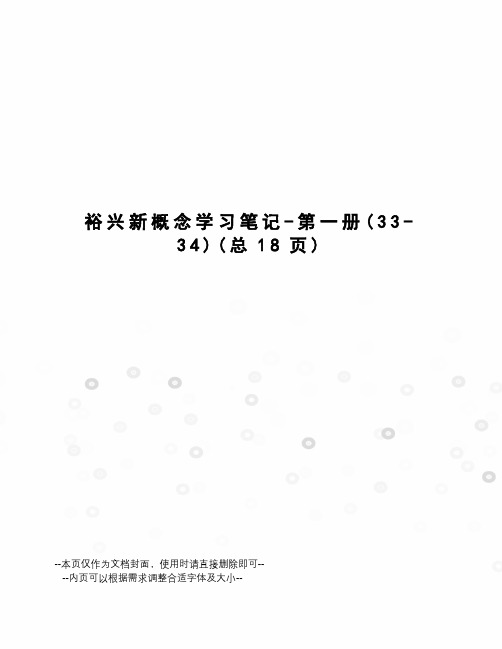
裕兴新概念学习笔记-第一册(33-34)(总18页)--本页仅作为文档封面,使用时请直接删除即可----内页可以根据需求调整合适字体及大小--Lesson 33 A fine day 晴天语音连读在语流中连读是常见的现象,一般是在有意义连系的词之间,可以是辅音与元音之间的连读,也可以是元音与元音之间的连读.eg. Please co me in.I must finis h i t in an hour and a half.O ne of us must goHe re is a pai r of shoes在句子中间有停顿的地方不能连读. 例如, 在下面一句中it 与you 不能连读.eg. If you need it, you may keep it.New Words and expressions 生词和短语day n. 日子cloud n. 云sky n. 天空sun n. 太阳shine v. 照耀with prep. 和……在一起family n. 家庭(成员)walk v. 走路, 步行over prep. 跨越,在…之上、在….的正上方。
bridge n. 桥boat n. 船、小船(ship 大的轮船)river n. 河aeroplane n. 飞机ship n. 轮船shine v. 照耀sunshine n. 阳光fly v. 飞day n. 日子eg. It's a fine day. 好天气day after day 一天一天的/日复一日的 day and night 日日夜夜day-break 拂晓daydream v. 做白日梦eg. You are always daydreaming.你总是做白日梦.day after day 日复一日Sunday[] 星期天Monday 星期一Tuesday 星期二Wednesday 星期三Thursday 星期四Friday 星期五Saturday 星期六It's a fine day today.今日天气晴朗moon 月亮cloud n. 云(可数名词)eg. There are some clouds in the sky.天空中有一些云彩.black cloud 乌云eg. When there are black clouds, you can tell it's going to rain.当乌云密布的时候,天就快下雨了.cloudy: adj. 多云的 full of cloudsWhat's the weather like todayIt's cloudy.cloudless adj. 无云的,晴朗的 without clouds n. 万里无云(可数名词) sky n. 天空in the sky 在空中eg. There is a bit of blue sky between clouds.在云彩之间可以看到一点蓝天.sky blue 天蓝色sky-high adj. 非常高 very higheg. Prices have gone sky-high.价格已经高的不得了.sky light n. 天窗sun n. 太阳son n. 儿子sunrise n. 日出sunset n. 日落eg. a beautiful sunrise 美丽的日出a beautiful sunset 美丽的日落sunglasses n. 太阳镜a pair of sunglasses 一副太阳镜eg. There are two pairs of sunglasses in her handbag.有两幅太阳镜在她的手提包里.Take off your sunglasses, please./ Take your sunglasses off, please.= Take them off, please.请脱掉你的太阳镜.sun n. 太阳sunny 晴朗的,充满阳光的( cloudless )a sunny room 充满阳光的房间a sunny day 晴天shine v. 照耀eg. The sun shines every day.太阳每天照耀着大地.The sun is shining.太阳正照耀着大地.sunshine 阳光,阳光的照耀sunlight 阳光eg. You're my sunshine after the rain.你是我雨后的阳光.with prep. 和...在一起be with .... 和... 在一起eg. I'm with my parents.我和我的父母在一起.She is with her family.她和他的家人在一起.They are with their children.他们在和他们的孩子在一起.family n. 家庭 (成员)----- How many people are there in your familyThere are four people in my family.family man 家庭观念很强的人/已有家的男人family doctor 家庭医生home 抽象概念eg. My home is in China.我家在中国.house 指房子结构eg. Will you come to my house tomorrow walk home 走回家go out for a walk 散步eg. Let's go out for a walk.让我们出去散散步呢.over prep. 跨越, 在...之上on 在....之上(接触物体表面) beneath 在...之下eg. A book is on my desk.一本书在我的书桌上.eg. There is a village beneath the hills.山脚下有一个村庄.above 在 ... 上方below 在 ... 下方eg. The book is above me on the shelf.书在我上方的书架上.Put the desk below the picture.把书桌放在这幅画的下面.over 在 ... 垂直的上面under 在 ... 垂直的下面eg. The bridge is over the river.桥在河的上面.The pair of shoes is under the chair.那双鞋在椅子下面.over adv. 跨越go therego over thereeg. He is going there. 他打算去那. He is going over there.go to Francego over to Franceeg. They will go over to France.他们将去法国.come to my housecome over to my houseeg. My friend is coming over to my house.我的朋友就要到我家来了.bridge n. 桥eg. There is a bridge over the river.江上有一座桥.walk on the bridge 在桥上走walk over the bridge 走过桥boat n. 船 (用木浆划水的船)boat race 赛船in the same boat 同在一条船上( 指同在一个不好的形势下)eg. If you lose your job, I'll lose mine, We are in the same boat.你丢了工作,我也会丢了我的工作,我们在同一条船上. river n. 江,河eg. There are some boats on the river.有几只小船在江面上.There are many fishes in the river.在河里面有许多种鱼.ship n . 轮船spaceship 宇宙飞船aeroplane n. 飞机(正式)plane 飞机(口语)fly1. v. 飞;飞行eg. An aeroplane is flying over the river. 一架飞机正在飞越这条江.fly a kite 放风筝.I must fly. 我必须马上走了./我必须赶紧离开.eg. I am late , I must fly. 我晚了, 我必须抓紧时间.I am flying to London tomorrow. 我明天要飞到伦敦去.2. n. 苍蝇not hurt a fly. 非常善良,非常温顺 (连一只苍蝇都不肯伤害)TEXT 课文Questions:1. Is it a fine day or not天气好不好2. Who is Mr. Jones with琼斯先生和谁呆在一起It is a fine day today.Where is the Jones family On the bridge.琼斯一家人在哪里在桥上It is a fine day today. 今天天气不错。
新概念英语第一册学习笔记(可打印)
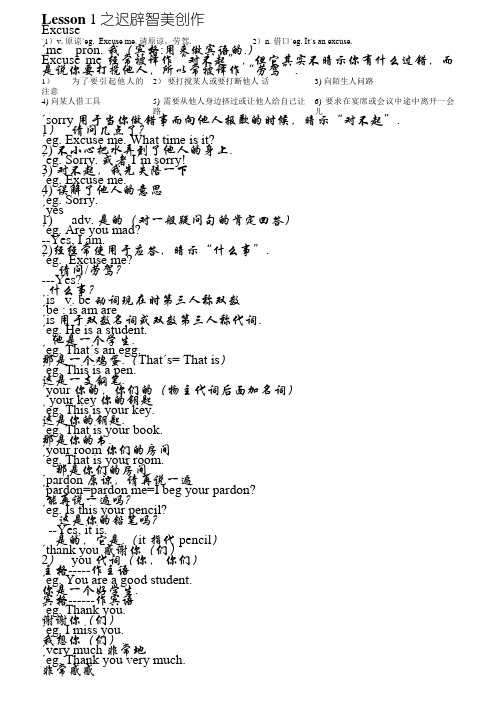
Lesson 1之迟辟智美创作Excuse΄1)v. 原谅΄eg. Excuse me. 请原谅,劳驾. 2)n. 借口΄eg. It΄s an excuse.΄me pron. 我(宾格:用来做宾语的.)Excuse me经常被译作“对不起”,但它其实不暗示你有什么过错,而是说你要打搅他人,所以常被译作“劳驾”.1)为了要引起他人的注意2)要打搅某人或要打断他人话3) 向陌生人问路4) 向某人借工具5) 需要从他人身边挤过或让他人给自己让路6) 要求在宴席或会议中途中离开一会儿΄sorry 用于当你做错事而向他人报歉的时候,暗示“对不起”. 1)请问几点了?΄eg. Excuse me. What time is it?2) 不小心把水弄到了他人的身上.΄eg. Sorry. 或者I΄m sorry!3) 对不起,我先失陪一下΄eg. Excuse me.4) 误解了他人的意思΄eg. Sorry.΄yes1) adv. 是的(对一般疑问句的肯定回答)΄eg. Are you mad?--Yes, I am.2)经经常使用于应答,暗示“什么事”.΄eg. Excuse me?请问/劳驾?---Yes?什么事?΄is v. be 动词现在时第三人称双数΄be : is am are΄is 用于双数名词或双数第三人称代词.΄eg. He is a student.他是一个学生.΄eg. That΄s an egg.那是一个鸡蛋.(That΄s= That is)΄eg. This is a pen.这是一支钢笔.΄your 你的,你们的(物主代词后面加名词)΄your key 你的钥匙΄eg. This is your key.这是你的钥匙.΄eg. That is your book.那是你的书.΄your room 你们的房间΄eg. That is your room.那是你们的房间.΄pardon 原谅,请再说一遍΄pardon=pardon me=I beg your pardon?能再说一遍吗?΄eg. Is this your pencil?这是你的铅笔吗?--Yes, it is.是的,它是.(it 指代 pencil)΄thank you 感谢你(们)2)you 代词(你,你们)主格-----作主语΄eg. You are a good student.你是一个好学生.宾格------作宾语΄eg. Thank you.谢谢你(们)΄eg. I miss you.我想你(们).΄very much 非常地΄eg. Thank you very much.非常感感΄eg. I love you very much.我非常爱你.. Grammar1. 一般疑问句;把系动词be(is, am, are) 置于句首΄eg. This is a handbag.这是一个手提包.(肯定句)΄eg. Is this a handbag.---Yes, it is. (肯定回答)(it 代handbag)---No, it is΄t.(否定回答)2. 否定句:把not 加在系动词的后面΄is not = isn΄t΄am not΄are not΄eg. This is not my handbag.小结1. Excuse me .对不起,劳驾.2. Pardon?请再说一遍.3. Thank you very much.非常感谢.΄watch1) n. 手表΄eg. My watch is new.我的手表是新的.΄eg. Is that your new watch?---Yes , it is.2) v 看΄watch TV΄house 房子Exercise BLook at the situations. What expression do you use for each?1. You don΄t hear so mething very clearly. What do you say?当你没有听清楚他人的说话时,你应该说:Pardon?I beg your pardon?Pardon me?2. If you what to leave for a little while in the meeting. What do you say?会议中途你想离开一会儿,你应该说:Excuse me3. When you step on one΄s foot, what do you say?当你不小心踩了他人的脚时,应该说:Sorry.4. When someone helps you. What do you say?当他人帮手了你,你应该说Thank youThank you very much小结含有系动词is 的句型转换1. 陈说句 This is …..That is….2.一般疑问句 Is….?3.肯定回答:Yes , it isYes , she is4.否定回答:No, it isn’t .No, she isn’t.5. 否定句:系动词后面加not.语音中元音:[Λ]—u o ou口腔几乎全开,嘴唇成自然状态,短音.‘up 向上 shut 关上 cup 茶杯 bus 公共汽车 much 许多 lunch‘son 儿子 honey 亲爱的人 money 钱 other 其它的‘enough 足够的 cousin 侄子 young 年轻的Read these sentences:1. You shut up. 你闭嘴.2. My son has much money. 我儿子有许多钱.3. His son always comes here for money. 儿的儿子总是来这儿要钱.4. Her young cousin has enough money for the lunch.她的小侄子有足够的钱付这顿午餐.中元音:[ə:]—ir ur or er ear口腔半开,嘴唇成自然状态,长音.‘bird 鸟 first 第一 girl 女孩 dirty 脏的 shirt 衬衫‘turn 翻转 church 教堂nurse 护士burn 燃烧‘work 工作 worm 虫子 word 单词 world 世界 worse 更坏的‘verb 动词 mercy 同情‘early earth searchRead these sentences;1. This nurse wears a dirty shirt 这位护士穿了一件脏裙子.2. It’s the early bird that catches the worm.早起的鸟有虫吃.3. This girl works in the church.中元音:[ə] ---er‘worker teacher sister brother‘about arrive among1. Her sister is a teacher.2. This famous doctor arrives in the city.3. His sister wants some sugar.New words and expressions‘please1) 请(可置于句首,也可置于句末)Come in please=Please come inSit down please=Please sit down2) 求求你(重读)‘eg. Don’t tell my mother about it, please! 不要把这件事告诉我的妈妈,求求你了.‘eg. Help me, please! 帮帮我,求求你了.‘here adv. 这里‘there adv. 那里‘eg. Come here. 到这儿来.‘eg. Go there. 到那儿去.‘here 与 there 置于句首时,后面主谓要倒装.‘eg. Here is my ticket.(here放置于句首,后面的系动词is 在主语my ticket的前面)正常语序:My ticket is here.‘‘my pron. 我的(物主代词不成以独自使用后面要加名词)Her boyfriend is very rich.她的男朋友很有钱.Welcome to our school.欢迎到我们学校来.‘ticket n. 票‘an air ticket‘a train ticket‘a bus ticket‘a cinema ticketHere is my air ticket‘‘telephone number 德律风号码‘number + 基数词第….‘number one 第一‘number twoI am number one.‘Lesson five 第五课‘day five 第五天‘five +可数名词复数形式五个…(暗示数量为两个以上的名词都要用复数形式,即在词尾要加s)‘five handbags 五个手提包’‘sorry 经常使用于对自己所犯的过失暗示报歉Excuse me .打搅他人时说的客套话.I’m sorry,. I broke yourglass.Excuse me. May I ask you a question?‘sir n. 先生暗示对不相识的男子,年长者或上级的一种尊称,一般独自便用,后面不与姓氏连用.Excuse me, sir.Thank you, sir.Can I help you, sir?Mr. 也是“先生”的意思,但与sir的用法上有所分歧,Mr..必需与姓氏连用,不成独自便用.Mr. Zhang.TestQuestion:Does the man get his umbrella back? 这位男士有没有要回他的雨伞?My coat and my umbrella please.此句省略了动词give(给)‘give sb sth 把某物给某人(sb 是somebody 的缩写,暗示“某人”)(sth 是 something的缩写,暗示“某物”)Give me my coat and my umbrella please.Here is my ticket此句为倒装句,副词here/three置于句首时,主谓要倒装.正常语序:My ticket is here.Here’s your umbrella and your coat.‘and 暗示“和”,是连词,连接两个并列成分,位置可以互换.My father and my mother.Is this your umbrella?此句为一般疑问句.含有系动词be 的陈说句酿成一般疑问句,把系动词置于句首,句号变问号,用升调.Is this her can?Yes, it is.Is this it ? = Is this your umbrella?‘it 指your umbrella,由于前面提到了umberlla, 所以后面就用it 来取代,以免重复.I want a man’s suit. 我想要一套男装.‘at school 在学校求学Her son is at school.她的儿子在学上校上学.‘go to school 去上学My son is very strong.My daughter is very lovely.我的女儿非常可爱.我妈妈的那套衣服不是黑色的.My mother’s(名词所有格) suit isn’t black.Lesson5语音:后元音(五个); 用舌的后部感觉发音.[a:] 口腔全开,嘴唇成自然装态,不扁也不圆,长音.‘ar car hard star park farm dark party start‘a fast past father‘ear heart‘al half1. You can’t park your car on the farm.2. The party starts at half past ten.3. I can’t see the stars in the dark sky.[]发音时舌尖要离开下齿龈,口形椭圆,肌肉放松,短音.闭音节单词中o‘job clock long stop lost got boss hot‘a watch water1. She lost that job, but she got this job.2. The clock often stops.[]‘or born sport horse short‘al all tall fall wall talk‘aw paw law draw‘au‘augh taught caughtLesson fiveMr. 先生(不成独自使用)Mr. + 姓氏Mr. leeMr. zhang‘sir 先生可以独自使用,是对上级,长者,或陌生男性的尊称.Sir 后面不能加姓氏.Thank you, sir.Sorry, sir.Can I help you, sir?‘good adj. 好反义词 bad adj. 坏的This is a good book.She is a good teacher.‘morning n. 早晨‘afternoon n. 下午‘evening n. 晚上‘night n. 夜里Good morning.Good afternoon,Good eveningGood night‘in the morning 在早上‘in the afternoon 在下午‘in the evening 在晚上‘at night 在夜里Miss 小姐(一般指未婚女性)Miss + 姓氏Miss LeeMrs. 太太(己婚女性)Mrs. +丈夫的姓氏Mrs. Black 布莱克太太(其丈夫姓Black)Ms. 女士(对未知婚姻状况者的称呼)Ms. Lee 李女士英语国家人名的构成:‘first name + middle name + aurname名字中间名姓‘new adj. 新的反义词 old adj. 旧的That is my new shirt.Is this your old dress?French n. 法国人(国籍);法语‘adj. 法国的Miss Lee is French.I can speak French.He is a French student.France n. 法国(国名)I come from France.I am from France.German n. 德国人(国籍);德语‘adj. 德国的Are you German?He can speak German.Is Miss Sophie Dupont a German student?Germany [‘ə:məmi]n.德国(国名)‘meet v 遇见,碰见Nice to meet you这是非正式场所下初度见面时的客套用语.回答也应为:Nice to meet you, too.在正式场所中How do you do? 你好回答也是How do you do?Japanese n. 日自己(国籍),日语‘adj. 日本的Japan n. 日本(国名)Korean n. 韩国人(国籍); 韩国语‘adj. 韩国的Korea n. 韩国(国名)Chinese n.中国人(国籍); 汉语‘adj. 中国的China n. 中国(国名)China is a big country.‘too adv. 也用在肯定和疑问句中.否定句中用either, too 和 either 一般都放在句末,而且用逗号隔开.Miss Dupont is French, too.Mrs. Lee is not German, either.Good morning.也可以直接用hello 问好.This is Miss Sophie Dupont. Sophie is a new student. She is French.“This is + 姓名”是把一个人介绍给另一个人时用的句型.向他人介绍自己时:My name is 或者是 I am.He is German=He is from Germany.Nice to meet you.用于非正式场所的初度见面.回答:Nice to meet you, too.Lesson 6‘make1) n. (产物的)牌号My shirt is a Korean make.我的衬衫是韩国牌子的.What make is your car?2) v. 制造,做make a car‘make a model plane.Swedish n. 瑞典人(国籍)‘adj. 瑞典的Sweden n. 瑞典(国名)Sweden is in Europe.瑞典在欧洲.‘英语,英国人England n. 英格兰,英国American adj. 美国的‘n 美国人America n. 美国Italian adj. 意年夜利的‘意年夜利人,意年夜利语Italy n. 意年夜利(国名)选择疑问句Is she a Chinese teacher or a Japanese teacher?She isn’t a Chinese teacher. She is a Japanese teacher.Lesson 7‘name 姓名My name is ….Your name is …His name is …Her name is…My name is Wendy.I am …含系动词的特殊疑问句结构:特殊疑问句+系动词+主语?What color is his shirt?What is your name?‘nationality n. 国籍What nationality are you?你是哪国人?Where are you from?Where do you come from?‘job 工作What is your job?What do you do?你的工作是什么?Lesson nine‘how 怎么样 (特殊疑问词)‘how many 几多(可数名词复数)How many students?‘how much 几多(不成数名词,价格)How much tea?How much is the handbag?‘how long 多长时间How long have you been in China?‘how often 多经常(频率)How often do you take a bath?‘how far 多远(距离)How far is it from here?‘how soon 多久I am leaving for Shanghai on business.How soon will you come back?‘well1) adv. 好(修饰动词)He cooks well.He dose well in English.3) adj. 身体好How are you, today?I am well. Thank you, and you?‘see 暗示结果‘look 强调举措过程Look at the blackboard.‘watch 看,注视(所看画面是移动的)Nice to meet you.(初度见面时打招呼用语)Nice to see you.(相互认识的人见面时打招呼用)This is our classroom.Whose classroom is this?Whose is this classroom?形容词性物主代词是修饰名词的,所以后面必需加名词.This suit is my. (错语)This suit is mine. (正确)名词性物主代词必需独自使用,后面不再接名词.名词所有格是在词尾加’s.这种形式即具有形容词性,也具有名词性.Whose shirt is this?This is Wendy’s(作形容词性物主代词来用) skirt.=This is her skirt. Whose is this skirt?This skirt is Wend’s. =This skirt is hers.Your car is red; mine is blue.‘mine =my carI have my way, and she has hers.我有我的处事方式,她有她的.‘whose 引导的特殊疑问句即可用形容词性物主代词回答,也可用名词性物主代词回答.Whose house is this?This is our house. = This house is ours.‘perhaps=maybe 可能Perhaps it will rain.Perhaps it is his car.‘catch v.1) 接住Catch2) 逮住,捕捉‘catch a thief3) 染上(疾病‘catch a cold‘father=Dad‘mather=Mum‘parents: father and motherHis parents is in Germany.(his parent 复数,故系动词用are)What makeWhat make is your watch?‘come v. 来‘go v. 去Come on; let’s go swimming.来吧,我们去游泳.Come on; stop day-dreaming.得了,奉求,别再做白天梦了.Come on; you’ll be fine.没关系,你会没事的.‘upstairs adv. 楼上‘downstairs adv. 楼下‘here there home abroad地址副词前不成以加介词.‘come here 不成以说成 come to here.‘smart adj.1) 漂亮的; 时髦的Lucy’s blouse is smart.Her hat is very smart2) 聪慧的; 机灵的She is a smart student.He is a smart businesman.‘clever 聪明的(指理解力); 狡猾的‘bright (多指小孩)Your little son is so bright.‘wise 理性的; 精明的(形容年纪较长者)‘lovely 可爱的Whose is this lovely hat?Whose lovely hat is this?It’s Ann’s (hat)‘cute 小孩可爱The baby is cute.祁使句:谓语动词一般用原形,暗示请求建议命令等.Follow meShut the door, pleaseBe carefulGo and buy a new hat.Wait and see‘same 常与the 连用暗示同一的,相同的‘the same ageThe same cityWe live in the same city.‘friend n. 朋友Are they your friends?‘‘be friendly to sb 对….友好She is friendly to me.(to 介词后面要接宾语)2)在以“s”“x”“sh”“ch”结尾的双数名词变复数时,需在单词后面加“es”‘bus buses dress dresses3) 以元音字母加“y”结尾的双数名词变复数,我们在词尾加s‘boy boys以辅音字母加“y”结尾的单词,需把“y”去失落再加ies。
新概念英语1学习笔记

Pardon? 全句为 I beg your pardon.Is this your…?这是你的……吗?What make is it?它是什么牌子的?What’s your job?你是做什么工作的?look at…看……Whose is this…? This is my/your/his/her…这……是谁的?这是我的/你的/他的/她的……Whose is that…? Th at is my/your/his/her…那……是谁的?那是我的/你的/他的/她的……Come upstairs and see it.不能用Come upstairs to see it.What colour’s your…?你的……是什么颜色的?Are you…? 你们是……吗?可数名词的复数形式一般是在名词后面加上-s;如果名词是以-s结尾的,变成复数时要加-es。
表示复数的-s或-es一般遵循以下发音规则:1.如果名词词尾的发音是一个清辅音(/s/,/ʃ/,/ʧ/除外),-s发/s/的音;2.如果名词词尾的发音是一个浊辅音(/z/,/ʒ/,/ʤ/除外)或元音,-s发/z/的音;3.如果名词词尾的发音是/s/,/z/,/ʃ/,/ʒ/或/ʤ/,-s发/ɪz/的音。
What are their jobs?他们是做什么工作的?如果名词是以-f或-fe结尾的,变成复数时,一般要把-f或者-fe变成-v,再加-es。
英语中有一些名词的复数形式是不规则的。
Look at them!看看他们/它们!Give me/him/her/us/them a…给我/他/她/我们/他们一……Which one?哪一……?Give me/him/her/us/them some…给我/他/她/我们/他们一些……Which ones?哪些……?人称代词作宾语时要用人称代词的宾格,如me(I的宾格),us(we的宾格),you(you的宾格),him(he 的宾格),her(she的宾格),them(they的宾格)和it(it的宾格)。
新概念英语笔记第一册
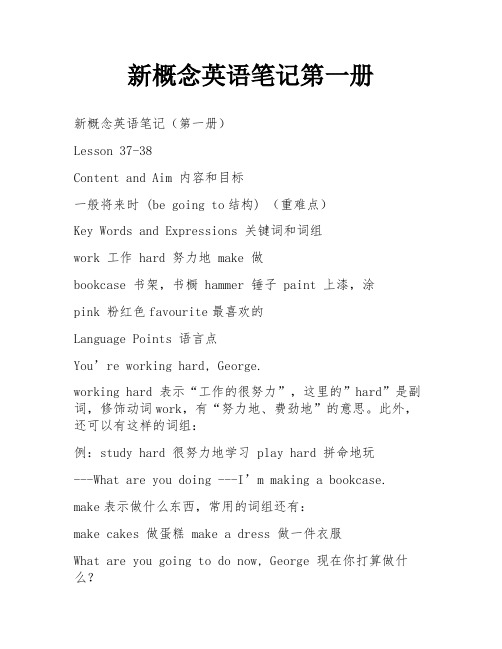
新概念英语笔记第一册新概念英语笔记(第一册)Lesson 37-38Content and Aim 内容和目标一般将来时 (be going to结构) (重难点)Key Words and Expressions 关键词和词组work 工作 hard 努力地 make 做bookcase 书架,书橱 hammer 锤子 paint 上漆,涂pink 粉红色favourite最喜欢的Language Points 语言点You’re working hard, George.working hard 表示“工作的很努力”,这里的”hard”是副词,修饰动词work,有“努力地、费劲地”的意思。
此外,还可以有这样的词组:例:study hard 很努力地学习 play hard 拼命地玩---What are you doing ---I’m making a bookcase.make表示做什么东西,常用的词组还有:make cakes 做蛋糕 make a dress 做一件衣服What are you going to do now, George 现在你打算做什么?这句话表示“打算做什么事”,在英语里用于表示“打算、按计划、准备”说明在最近要做的某事时,用be going to的形式,是一个将来时间的概念。
例如:What are you going to do 你打算做什么?I’m going to cook a meal. 我打算做一餐饭。
What is she going to do 她打算做什么?She’s going to air the room. 她打算给房间通通风。
什么是一般将来时?在英文中表示一个将要发生的动作就是一般将来时,谓语动词则需要用一般将来时。
一般将来时的结构?–->Be动词+going to+动词原形am/is/are +going to+动词原形Will/Shall+动词原形肯定句:主语+be动词+going to+动词原形主语+will/shall+动词原形否定句:主语+be动词+not+going to+动词原形主语+will/shall +not+动词原形(will not=won’t; shall not=shan’t)一般疑问句:be动词+主语+going to+动词原形回答:Yes, 主语 + be/ No, 主语 + be + notWill/Shall+主语+动词原形回答:Yes, 主语 + will/not / No, 主语 + will/shall + not特殊疑问句:What+be动词+主语+going to+动词原形What+will/shall+主语+动词原形例如:I’m going to play basketball. 我打算去打篮球。
新概念英语第一册073-080课自学笔记(很全、很好)

新概念英语第⼀册073-080课⾃学笔记(很全、很好)Lesson 73 The way to King Streetgo went gone lose lost lost see saw seen say said said speak spoke spoken tell told toldput put put take took taken read read read find found found do did done1. She does not know London very well.know (a place) very well 对⼀个地⽅和熟悉也可以把“a place”换成“⼈”,例如:I know him very well.否定形式I don’t know the city very well.2. She does not know London very well,and she lost her way.句中的and当“所以”讲,表⽰结果。
前半句“she does not know London very well”讲的是⼀个事实,所以⽤⼀般现在时,⽽后半句“she lost her way”讲的是发⽣在上个星期的事情,所以⽤⼀般过去时。
3. and的⽤法(1)基本⽤法:单词and表⽰“和”、“⽽且”的意思,⽤来连接对等关系的字与字,短语与短语,句⼦与句⼦。
Brother and I went to the bookstore yesterday.(我和我哥哥昨天去过书店。
)I went to the Summer Palace and he went to Bei Hai Park.注意:单词或词组如果是三个以上连接,⼀般在最后的单词或词组前加and。
另外,and在译成中⽂时,不⼀定要翻译出“和”来。
(2)特别⽤法:①and⽤于祈使句中。
Use your head ,and you?ll find a way. = If you use your head,you?ll find a way.(动动脑筋,你就会想出办法来。
新概念英语笔记

新概念英语笔记Lesson 1: Excuse me新概念英语第一册是针对中学生和成人初学者而设计的一本教材,其内容涉及如下几方面:一、语音二、词汇三、课文四、语法学习方法与指导一、语音英语音标的系统讲解将在前四十课内完成。
通过对语音部分系统全面的学习,了解英语的基本发音规律及特点,掌握英语单词的读音规则及句子的发音技巧,为今后的英语学习奠定良好的语音基础。
学生首先要听清楚每个的发音,掌握其要领,然后认真模仿,争取把每一个音都发得准确、到位。
二、词汇本教材蕴含了丰富的词汇。
第一册单词比较常用,而且也都简单易懂,在授课过程中,我们又以书上的生词为基础,有针对性地对这些单词作了必要的补充。
比如同义词、反义词及这些单词的副词、形容词和名词形式等等。
学生可以运用单词联想记忆法迅速扩充词汇,同时还可以了解一些英语的基本的构词法,使单词的记忆变得更轻松。
同时我们也对一些词汇的其它常用意思和用法作了适当的补充,而且所补充的这些单词不是孤立的,他们都附有大量的例句,以便学生能够清楚地知道运用这些词汇的具体情景,使学生在词汇的运用上把握得更准确、自如,从而达到事半功倍的效果。
三、课文多为对话,不涉及写作方面的知识,也没有长篇阅读的文章,内容简单易懂。
课文中的语言多为生活化的语言,具有很强的实用性。
学生要充分利用课文现有的资源,首先要多听,多读,尽量地模仿它的语音语调,并最终达到学以致用。
四、语法第一册将涉及到如下语法项目:1)名词的单复数形式、助动词和情态动词的用法、介词短语、There be 句型、定语从句、形容词和副词的比较级和最高级等等2)现在进行时、一般现在时、一般过去时、过去进行时、现在完成时、过去完成时和将来时要准确地掌握语法规则才能准确地把握句子结构。
有了较强的语法功底才能更好地,系统地掌握一门外语。
学生首先要对这些概念做到心中有数。
最终学到的知识都是为了实际运用,而一口流利的英语一定是从实践中锻炼出来的。
新概念英语第一册笔记L1-2
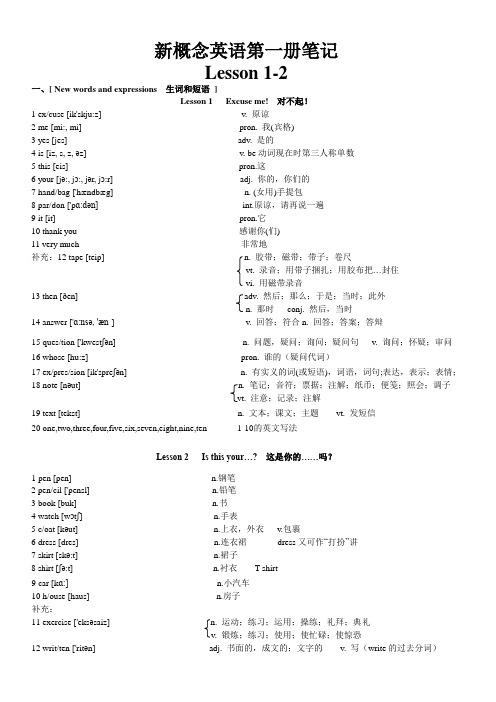
新概念英语第一册笔记Lesson 1-2一、[ New words and expressions 生词和短语]Lesson 1 Excuse me! 对不起!1 ex/cuse [ik'skju:z] v. 原谅2 me [mi:, mi] pron. 我(宾格)3 yes [jes] adv. 是的4 is [iz, s, z, əz] v. be动词现在时第三人称单数5 this [eis] pron.这6 your [jə:, jɔ:, jər, jɔ:r] adj. 你的,你们的7 hand/bag ['hændbæg] n. (女用)手提包8 par/don ['pɑ:dən] int.原谅,请再说一遍9 it [it] pron.它10 thank you 感谢你(们)11 very much 非常地补充:12 tape [teip] n. 胶带;磁带;带子;卷尺vt. 录音;用带子捆扎;用胶布把…封住vi. 用磁带录音13 then [ðen] adv. 然后;那么;于是;当时;此外n. 那时conj. 然后,当时14 answer ['ɑ:nsə, 'æn-] v. 回答;符合n. 回答;答案;答辩15 ques/tion ['kwestʃən] n. 问题,疑问;询问;疑问句v. 询问;怀疑;审问16 whose [hu:z] pron. 谁的(疑问代词)17 ex/pres/sion [ik'spreʃən] n. 有实义的词(或短语),词语,词句;表达,表示;表情;18 note [nəut] n. 笔记;音符;票据;注解;纸币;便笺;照会;调子vt. 注意;记录;注解19 text [tekst] n. 文本;课文;主题vt. 发短信20 one,two,three,four,five,six,seven,eight,nine,ten 1-10的英文写法Lesson 2 Is this your…?这是你的……吗?1 pen [pen] n.钢笔2 pen/cil ['pensl] n.铅笔3 book [buk] n.书4 watch [wɔtʃ] n.手表5 c/oat [kəut] n.上衣,外衣v.包裹6 dress [dres] n.连衣裙dress又可作“打扮”讲7 skirt [skə:t] n.裙子8 shirt [ʃə:t] n.衬衣T-shirt9 car [kɑ:]n.小汽车10 h/ouse [haus] n.房子补充:11 exercise ['eksəsaiz] n. 运动;练习;运用;操练;礼拜;典礼v. 锻炼;练习;使用;使忙碌;使惊恐12 writ/ten ['ritən] adj. 书面的,成文的;文字的v. 写(write的过去分词)13 write [rait] vi. 写,写字;写作,作曲;写信vt. 写,书写;写信给;著述14 copy ['kɒpɪ] n. 副本;一册;摹仿v. 复制;复印;抄袭15 these [ði:z] pron. 这些adj. 这些的16 sen/tence ['sent(ə)ns] n. [语][计] 句子,命题;宣判,判决vt. 判决,宣判17 study ['stʌdɪ] n. 学习,研究;课题;书房;学问vt. 学习;考虑;攻读;细察18 furt/her ['fə:ðə] adv. 进一步地;而且;更远地adj. 更远的;深一层的vt. 促进,助长;增进19 gram/mar ['græmə] n. 语法;语法书二、[Word study 词汇学习 ]Lesson 1 Excuse me! 对不起!1、Excuse v. 原谅[补充] n. 1)借口;理由;2)辩解vt. 1) 原谅;宽恕;2)为……辩解[搭配] Excuse me.原谅;打搅一下;对不起In excuse of 为……辩解[记忆]以-use结尾的单词还有:use [ju:z] vt. & n. 使用amuse [ə'mju:z] vt. 娱乐;消遣;使发笑;使愉快refuse [ri'fju:z, ri:-] n. 垃圾;废物v. 拒绝;不愿;抵制[同义词] pardon; forgive [fə'ɡiv]v. 原谅;免除(债务、义务等)2、me(1)主格:用在句首,一般作主语。
新概念第一册课文翻译与学习笔记[Lesson85、87、89]
![新概念第一册课文翻译与学习笔记[Lesson85、87、89]](https://img.taocdn.com/s3/m/39d286d0dd88d0d233d46a7b.png)
新概念第一册课文翻译及学习笔记【Lesson85、87、89】Lesson85 Paris in the SpringGeorge: Hello, Ken.Ken: Hello, George.George: Have you just been to the cinema?Ken: Yes, I have.George:What’s on?Ken:“Paris in the Spring”.George: Oh, I’ve already seen it. I saw it on a B.B.C. television programme last year. It’s an old film, but it’s very good.Ken: Paris is a beautiful city.George: I have never been there. Have you ever been there, Ken?Ken: Yes, I have. I was there in April.George: Paris in the spring, eh?Ken: It was spring, but the weather was awful. It rained all the time.George: Just like London!New Word and expressions 生词与短语Parisn. 巴黎cineman. 电影院filmn. 电影beautifuladj. 漂亮的cityn. 城市neveradv. 从来没有everadv. 在任何时候本文参考译文乔治:你好,肯。
肯:你好,乔治。
乔治:你刚去过电影院吗? 肯:是的,我刚去过。
乔治:上映什么片子? 肯:《巴黎之春》。
乔治:噢,我已看过了。
我是去年在电视上看的。
这是老部片子,但很好。
肯:巴黎是座美丽的城市。
乔治:我从未去过。
- 1、下载文档前请自行甄别文档内容的完整性,平台不提供额外的编辑、内容补充、找答案等附加服务。
- 2、"仅部分预览"的文档,不可在线预览部分如存在完整性等问题,可反馈申请退款(可完整预览的文档不适用该条件!)。
- 3、如文档侵犯您的权益,请联系客服反馈,我们会尽快为您处理(人工客服工作时间:9:00-18:30)。
Lesson 117 Tommy's breakfast 汤米的早餐New Words and expressions 生词和短语dinning room(hall) 饭厅coin n. 硬币mouth n. 嘴swallow v. 吞下later adv. 后来toilet n. 厕所,盥洗室dinning room 饭厅,餐室(家中的)dinning 餐厅,餐厨用品dinning table 餐桌dinning car 餐车coin n. 硬币a silver coin 银币toss a coin 抛硬币(打赌正面和反面)eg. Could you change the one-dollar bill for coins?我用1美元纸钞和你换硬币好吗?Pay a person bake in his own coin.以其人之道还治其人之身.mouth n. 嘴eg. Open your mouth.张开你的嘴.-Don’t talk with your mouth full!-嘴里塞满食物时不要说话!Shut your mouth!(口语)闭嘴It sounds funny in your mouth.这种话由你的口中说出来,听起来就很可笑。
by word of mouth 口头上from hand to mouth 勉强糊口from mouth to mouth 口口相传have a big mouth 大嘴巴,嘴不严swallow1) v. 吞…, 咽…eg. He swallowed (up) the medicine with water.他把药和水一起吞下1) n. 一口(一口的量)take a swallow of beer 喝一口啤酒at one swallow 一饮而尽★swallow v. 吞下①v. 吞下,咽下Tommy had swallowed the coins.汤米已经吞下了那硬币.②v. 抑制,使不流露I tried hard to swallow my doubts.我强忍着不露出怀疑的神色。
She swallowed a smile and sat there still.她忍住没笑,静静地坐在那里。
③v. 吞并;侵吞Our company was swallowed up by an American company last year.我们公司去年被一家美国公司吞并了。
Nazi Germany nearly swallowed up the whole Europe in World War II.第二次世界大战中,纳粹德国几乎吞并了整个欧洲。
later1) adv. 后来,较迟地,较后地three days later 三天后eg. He came later than usual.他比平常来得晚。
see you later. 回头见sooner or later 早晚,总有一天2)adj. 较迟的,较后的,更近的。
in one’s later life 在某人的晚年eg. Let’s take a later train.我们搭晚一点的火车吧。
toilet n. 厕所,盥洗室bathroom/washroom 家庭用的restroom/lavatory 公用的pulic conveniences 委婉用语(英)comfort station 委婉用语(美)water closet(WC) 委婉用语(欧)toilet paper 卫生纸toilet roll (整卷的)卫生纸toilet soap 香皂toilet water 花露水,化妆水Grammar 用法过去进行时一、构成肯定式:was/ were + 现在分词疑问句式:把was/ were提前否定句式:在was/ were的后面加not二、过去进行时的基本用法1.表示过去某一时间正进行的动作。
这一特定的过去时间通常用时间状语,时间状语从句或由上下文来表示。
eg. They were shaving at seven this morning.今晨七点钟的时候他们正在刮胡子。
She was telephoning a friend when I came in.当我进来时,她在给一个朋友打电话。
2. 表示过去某一阶段一直在进行的动作。
eg. They were waiting for you yesterday.他们昨天在等你。
She was writing a story last year.她去年在写一部小说。
3.表示从过去某一个时间的角度看将要发生的动作,用于某些瞬间动作;go, come, leave, stay, fly 等。
eg. They were leaving a few days later.几天后他们要离开。
(从过去看)They are leaving in a few days.几天后他们要离开。
(从现在看)He told me that his brother was going to Suzhou.他告诉我他的哥哥要到苏州去。
4)与always 等副词连用,表示感情色彩。
eg. My brother was always losing his keys.我的哥哥总是把他的钥匙弄丢。
As a boy, John was always making things.还是孩子的时候,约翰总是制作东西。
三.过去进行时和一般过去时用法的比较1. 过去进行时通常有示在过去某一时刻或某一段时间正在进行的动作,强调在这一过程中所进行的动作或展开的情景;而一般过去时则只表示在过去某一时间发生某一件事。
eg. He drew a picture yesterday afternoon.(过去某一时间发生的事情,昨天下午画了一副画)He was drawing a picture yesterday afternoon.(昨天下午这一段时间所进行的动作是画画,强调这一过程中所进行的动作)2)过去进行时可以表示过去反复做的动作,而一般过去时表示具体的某一次行为动作。
eg. The frog was jumping up and down.这青蛙在不停地跳着.The frog jumped up and down.这青蛙跳了一下.He was nodding.他不停地点头。
He nodded.他点了点头。
3. leave, arrive, start, die 等用在过去进行时表示“快要完成,即将…”。
而用在一般过去时当中则表示“己经完成”。
eg. The train was stopping.火车快要停了。
The train stopped.火车停了。
Text: 课文When my husband was going into the dining room this morning, he dropped some coins on the floor.There were coins everywhere. We looked for them, but we could not find them all.While we were having breakfast, our little boy, Tommy, found two small coins on the floor.He put them both into his mouth. We both tried to get the coins, but it was too late. Tommy had already swallowed them!Late that morning, when I was doing the housework, My husband phoned me from the office.'How's Tommy?' he asked. 'I don't know,' I answered, 'Tommy's been to the toilet three times this morning, but I haven't had any change yet!'课文讲解:When my husband was going into the dining room this morning, he dropped some coins on the floor.今天早晨我丈夫走进饭厅时,把一些硬币掉在地上了.1.此句是过去进行时,结构是was/ were+ doing 表示过去某个时刻正在进行或发生的动作。
2. go into 走进,强调“进入”的动作,反义词go out of 走出…3. drop 掉下eg. Be careful! Don’t drop the vase.小心,别把花瓶摔了。
drop 还可以表示丢失,丢掉eg. I dropped my pen on the way home.回家的路上,我把等弄丢了。
There were coins everywhere. We looked for them, but we could not find them all.到处都是硬币,我们虽然找了,但没能把它们全部找到.1)everywhere 到处eg. I looked for my pen everywhere, but I couldn’t find it.我找遍了任何地方都找不到我的钢笔。
2. look for 寻找(强调动作和过程)find 找到(强调寻找的结果)eg. She was looking for her passport yesterday.Did she find it?Yes, She found it under the chair.3. but we could not find them all.find 强调找的结果。
all 是them的同位语。
4. could 是can的过去式。
While we were having breakfast, our little boy, Tommy, found two small coins on the floor.正当我们吃早饭时,我们的小孩汤米在地上找到了两枚小硬币.1. while“当…时”,过去进行时的时间状语从句一般由when, while及as等引导,说明主句中动作发生的情景。
while或at the same time强调同时进行的两种或几种动作。
